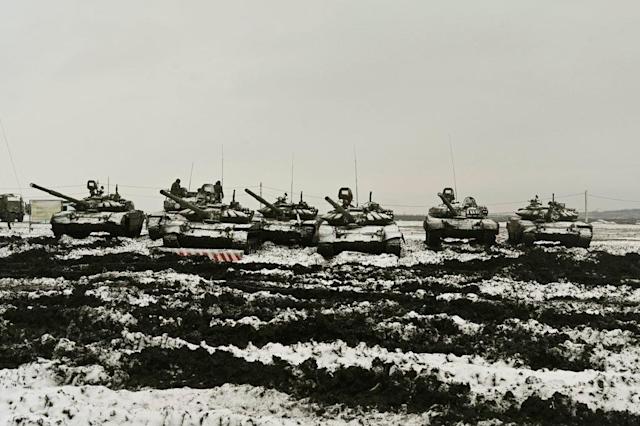By
Over the past few days, the United States has warned that a Russian invasion of Ukraine may be imminent. The chairman of the Joint Chiefs of Staff said Russia could take Kyiv in as few as three days. Moscow, for its part, has insisted that it has no intention of invading Ukraine. But Moscow has every reason to lie. The truth behind Washington’s statements is harder to parse.
Obviously, U.S. intelligence might have information indicating that the Russian military will invade this week. If so, publicly saying as much might be meant to deter Russia. The problem is that it won’t. The U.S. has made clear that it would respond to an invasion with extreme economic sanctions rather than with military force. So if Moscow has made up its mind to invade in spite of the consequences, acknowledging the imminence of the attack isn’t much of a deterrent.
That changes if an invasion triggered an American military response. If that were the case, Russia would have to be deeply concerned that U.S. intelligence knows exactly what it can do and what it plans to do. So by advertising the imminence of an attack, the U.S. could be assuming that Russia doesn’t want Ukraine badly enough to risk war, which always has an uncertain and messy outcome. If Moscow believed a fight was at stake with the U.S., it might reconsider its options.
It makes sense that Washington would want to deter Russia. The United States is not eager for a war with Russia, to say the least, and the best way to avoid a war is to threaten a counterstrike. Equally valuable is a public demonstration that American intelligence had penetrated Russian war plans. The Russians would have to assume that their war plans had been more broadly penetrated. If the U.S. knows the timing of the invasion, perhaps it also knows the formations to be used and movements and timing of movements. A three-pronged armored assault, each moving hundreds of miles and being refueled along the way, has to be choreographed like a ballet. If it’s disrupted by air and missile attacks, the entire movement could collapse for want of logistical support and loss of communication.
Under these circumstances, the U.S. – not wanting a war in Ukraine but feeling compelled to engage anyway – would be sending a very clear message: “We know your plans, and will strike at you.” The problem with this theory is that if the U.S. intended to counter a Russian attack by means other than sanctions, it would have made its intentions clear far in advance of the eve of an invasion. More important, the Russians would have seen American preparations. Russia was clearly capable of reconsidering its plans if it was genuinely concerned about the U.S. response.
And yet, the U.S. has refrained from saying outright that war is coming and that it will respond with all the power at its disposal. It has announced only Russia’s “intentions,” without any public hint that the U.S. intends to do something about it. It’s as if the U.S. wants the world to know it knows Russia will soon attack without doing anything other than raising an alarm. This is a strange way to build credibility. If you do not intend to act, it would be better to feign surprise. Having knowledge and still being beaten is a poor option.
If the U.S. is planning to counter the Russian attack, then advertising the fact that it has penetrated Russian war plans is perhaps the clumsiest move of all because Moscow will cancel the attack, create a new plan, and look for and shut down the leak. It is therefore difficult to assume Washington is planning a surprise counterattack, even if it is trying to convince Moscow that it is. It could be that Russia will call off the attack because it has no idea what America’s intentions are. Considering how good Russian intelligence generally is, that’s not very likely.
At this point, it’s all smoke and mirrors. The U.S. says Russia will attack, Russia says it won’t. One of them is either lying or wrong. Either way, the U.S. is drumming up war fever. It may be designed to keep allies like Germany in line, but it’s hard to see how shouting fire but not gathering fire engines will instill enough confidence to rally allies to the United States’ side. They may lose all confidence in Russia, but it is amazing how a victory rebuilds confidence.
Geopolitial Future




